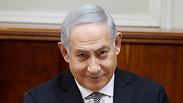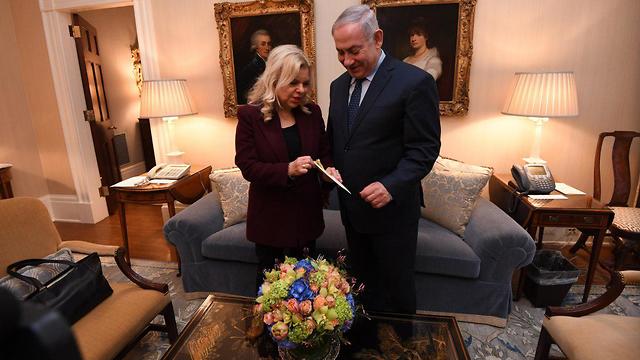

Kahlon, Litzman meet in attempt to solve coalition crisis over draft law
Deputy health minister promises to support 2019 state budget if finance minister postpones vote until Haredi-exempting amendment to draft law is approved; Prime Minister Netanyahu discusses crisis with Defense Minister Lieberman.
Netanyahu, currently on a state visit to the United States, spoke to Tourism Ministry Yariv Levin, who has been put in charge charge of reaching a compromise that would allow the passing of a Haredi-exempting amendment to the draft law, and to Defense Minister Avigdor Lieberman, who stated recently that his Yisrael Beytenu party would not allow the bill to pass.

Political sources say, however, that Netanyahu's efforts were insufficient, noting that there is a feeling the prime minister has yet to throw his weight around.
Meanwhile, Finance Minister Moshe Kahlon of the Kulanu party met Sunday with Deputy Health Minister Yaakov Litzman (United Torah Judaism). During the meeting, Litzman asked Kahlon to postpone the approval of the 2019 budget and allow the approval of the draft law beforehand. Litzman even offered to provide a commitment in writing to support the budget without any further demand, if the draft law is approved.
The government has two weeks to try to solve the coalition crisis. Despite declarations by coalition parties that they are uninterested in elections right now, if a solution to the exemption of Haredim from the military draft is not found and the budget cannot be passed, the Knesset is headed towards dispersal and the country to elections. Senior Bayit Yehudi and Likud officials have accused the prime minister, however, of taking advantage of the situation to call elections.
Education Minister Bennett implied in a conversation with party activists that Netanyahu was enjoying the situation. "It's a fake crisis," he stressed. "If Netanyahu wanted to, he would solve the crisis within 10 minutes."
Justice Minister Ayelet Shaked told the AIPAC conference in Washington on Sunday, “The draft law crisis is a fake crisis. It would be irresponsible for it to lead to early elections and the fall of a right wing government. We must work with our coalition partners for an agreeable compromise that everybody could live with.
“The current government is good and is doing important things in security, economics, law and education. There is no reason to give the left the pleasure of toppling a right-wing government. No one can promise that the left will not come to power," she said.
If the decision to head to elections is taken, the timing is very tight. The vote on dispersing the Knesset might even take place next week and election will be scheduled for June, at least three months from the vote.
At this rate, and if the opposing sides continue to stick steadfastly to their positions—the ultra-Orthodox are insisting on passing draft laws that will grant exemptions to yeshiva students whose Torah study is their profession, while opponents oppose any such bill before the state budget is passed—the Knesset will be dispersed shortly before the Passover holiday recess.
'Netanyahu is leading us to elections for his own sake'
Senior Likud members said in closed talks that Netanyahu was taking advantage of the situation to move up the elections to late June.
"June is Netanyahu's preferred date," said a senior source in the ruling party. "The next date for elections can only be after the High Holy Days in September, and no one knows how all the affairs against him will develop by then. He stands to benefit twice from moving up the elections now: He will be going to elections after waging a successful campaign (against the police recommendations in Cases 1000 and 2000) and will gain more disciplined coalition partners. The public must understand that Netanyahu is leading the country to elections for his own sake."
Another Likud source said that if Netanyahu is reelected, his partners would have trouble dissolving the government in case of an indictment against him.
"If a decision is made to indict him several months after the elections, it would be much harder for Bennett, Kahlon or Lieberman to disband a new government after Netanyahu received the public's trust," the source explained. "Instead of investigations, he can now call elections over the draft crisis."
Other Likud lawmakers fear they won't make it into the next Knesset in case of elections.
The government’s original plan was to pass the 2019 budget next week (the 13th through the 15th of March), a move that would have allowed the current coalition to hold steady until November, 2019.
But then the ultra-Orthodox parties realized that the last state budget for the present term, which is also their last lever of pressure to deal with a High Court of Justice ruling requiring a new draft law, might slip away from them - and in consultation with the Council of Torah Sages, the decision was made to shorten the life of the current government.
Netanyahu said before taking off for a five-day visit to the United States that there was no reason for the crisis regarding the draft exemption law to lead to early elections: "There is no reason for this to happen, and with good will, it will not happen. I have positive intentions; I hope that our partners do as well," he said.
In recent years, the Knesset has been deliberating the issue of enlisting ultra-Orthodox Jews to the IDF, and committees have formed and dispersed, sometimes even before they have succeeded in formulating an agreed-upon route.
But then the High Court got involved in the matter, which is considered especially volatile by governments with Haredi coalition partners, who consider the matter especially dear to their hearts, and instructed the government to pass an egalitarian recruitment law by September 2018.
Ultra-Orthodox parties formulated an outline that will try to bypass the High Court of Justice. First, they announced that they intended to enact a new Basic Law for Torah scholars, which would legally define Torah study for the first time; while the status of those studying Torah would be recognized just as the status of those who enlisted in the army is recognized.
In addition, the Haredim want to advance their own recruitment arrangement, which will enable anyone who wants to study Torah at a yeshiva to study without the state intervening. Thus, for example, the ultra-Orthodox propose to ease the sanctions that were set under previous arrangements against Yeshivot whose graduates do not enlist, and offer them alternatives.
The Haredim are looking to set relatively low recruitment targets, and to allow the government to make a decision that the quotas will be reduced (as long as they do not meet the target so as not to impose sanctions).
They have stressed that they are not interested in elections. Political sources say some UTJ members were stunned by the crisis and the very real threat of elections, but Deputy Health Minister Litzman has explained that their hands are tied and that they cannot accept any decision that deviates from the rabbis' explicit decision.
Litzman made it clear to Netanyahu that there would be no withdrawal from their original position, since the Haredim have no room to maneuver with regard to the issue of enlistment. "If there is no draft law, then there is no right for the government to exist," he told Ynet.
Netanyahu is expected to meet with US President Donald Trump on Monday and address the AIPAC conference on Monday. On Sunday, the prime minister met with Guatemalan President Jimmy Morales, who announced that his country would move its embassy to Jerusalem on May 16, two days after the US embassy move.
Itamar Eichner and Yuval Karni contributed to this report.

















